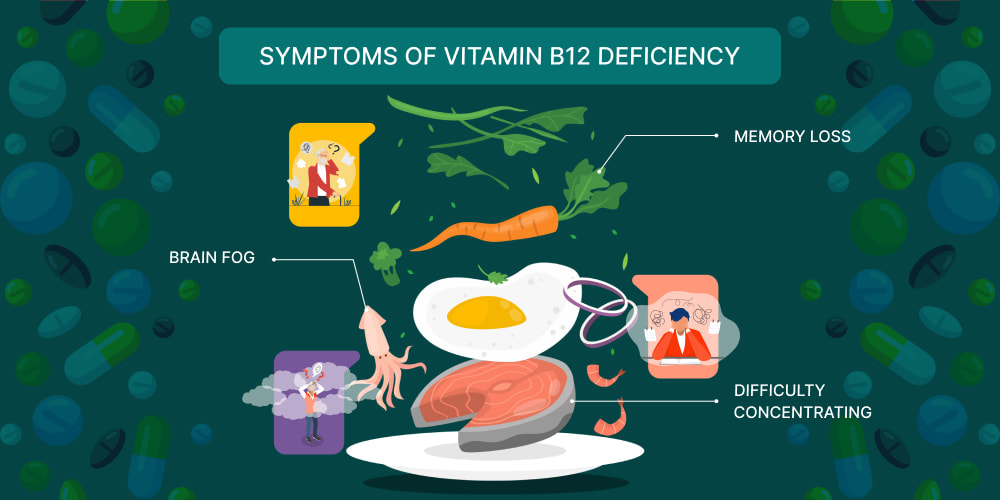Imagine your brain as a complex electrical grid, powering every thought, move, and feeling. Vitamins are essential for optimal brain nutrition and function, but when these vital elements are deficient, they can disrupt the brain’s intricate network. It can disrupt this intricate network and lead to a cascade of neurological issues.
This article explores the impact of vitamin deficiency on the nervous system. We’ll focus on how these shortages affect brain function. We’ll examine effects ranging from memory and concentration issues to the development of debilitating nerve issues.
We will explore the crucial role of B12, its connection to brain nutrition, and the broader impact of vitamin deficiency. Join us as we uncover the vital link between these micronutrients and the intricate workings of your brain.
The Critical Role of Vitamin B12 in Brain Health
B12 is a water-soluble vitamin. It plays a critical role in many functions in our bodies particularly in relation to neurological health and cognitive function. It’s not just important; it’s vital. Think of B12 as a master conductor in the orchestra of your brain. It ensures all sections play in harmony. One of its roles is in the methylation process.
This is a crucial biochemical reaction involved in:
- DNA synthesis
- Gene regulation
- Neurotransmitter production
B12 acts as a coenzyme in this process. It facilitates the conversion of homocysteine to methionine. Elevated homocysteine levels are linked to an increased risk of mental decline and dementia. It makes B12’s role in regulating these levels paramount.
Beyond methylation, vitamin B12 is directly involved in the formation and maintenance of myelin. This is the protective sheath that surrounds nerve fibers. It acts like the insulation on electrical wires. It ensures efficient transmission of nerve impulses. Without adequate B12, myelin can break down. It leads to nerve damage and neurological issues. This damage can manifest as anything from tingling and numbness in the extremities to more severe issues. Those include difficulty walking and cognitive impairment.
Besides, B12 is crucial for energy. It helps convert food into usable energy, and vitamin deficiency can lead to persistent fatigue and weakness. It impacts physical and mental performance.
Finally, B12 contributes to mental clarity and brain function. It supports the production of neurotransmitters, the chemical messengers in the brain. They influence mood, memory, and concentration.
Symptoms of Vitamin B12 Deficiency
The symptoms of vitamin deficiency can be subtle initially and it can gradually worsen over time. One of the most common is fatigue. This isn’t just regular tiredness. It’s a persistent, overwhelming exhaustion and it doesn’t improve with rest.
Imagine: struggling to get through your day, feeling drained even after a full night’s sleep. Another frequent sign is mental impairment. It can manifest as:
- Memory loss
- Difficulty concentrating
- Mental confusion
Picture yourself forgetting appointments, struggling to follow conversations, or feeling mentally sluggish. Neurological symptoms are another significant consequence of vitamin deficiency. These can include tingling or numbness in the hands and feet.
In more severe cases, it can lead to:
- Difficulty walking
- Balance issues
- Even muscle weakness
Other potential deficiency symptoms are mood changes like irritability or depression and an inflamed tongue. B12 is involved in so many processes. Vitamin B12 deficiency can affect each person differently.
The Connection Between Vitamin B12 and Brain Nutrition
B12 is a vital nutrient for the brain. It acts as a building block and a key player in several vital processes. It supports the health and function of nerve cells. How? It contributes to the formation and maintenance of myelin. A healthy myelin sheath ensures efficient communication between nerve cells.
It is crucial for memory, learning, and thinking. B12 also plays a crucial role in neurotransmitter production. They’re the chemical messengers that transmit signals between nerve cells. It influences mood, emotions, and mental processes. Proper brain nutrition levels are essential for the synthesis and function of these neurotransmitters. Ensuring sufficient B12 intake is therefore crucial not only for immediate brain function. It’s also for long-term health and mental well-being.
Vitamin Deficiencies Beyond B12: Impact on the Nervous System
B12 often takes center stage when discussing neurological health. However, it’s crucial to recognize that other vitamin deficiencies can also impact the neurological system and brain function. These vitamins work in concert and a deficiency in one can often affect the work of others. It creates a domino effect on brain health. Let’s explore other key vitamins:
- D. Often dubbed the “sunshine vitamin.” This one plays a vital role in brain development and cognitive function. It’s involved in the regulation of calcium. It is essential for nerve impulse transmission and neurotransmitter release. Vitamin deficiency is linked to an increased risk of mental decline, dementia, and mood disorders. Low levels can impair cognitive function. They affect memory, attention, and decision-making. Furthermore, vitamin D is thought to play a neuroprotective role. It shields cells from damage.
- Folate (B9). This one is crucial for cell growth and development. It’s particularly during periods of rapid growth like pregnancy. It’s also essential for DNA synthesis and repair. Vitamin deficiency can lead to elevated homocysteine levels. It increases the risk of mental impairment and dementia. Folate is also critical for neurotransmitter production and a deficiency can contribute to mood disorders and cognitive dysfunction.
- Thiamine (B1). This one is essential for glucose metabolism. This is the primary source of energy for us. It also plays a role in nerve impulse transmission and neurotransmitter synthesis. Vitamin deficiency can lead to serious neurological health conditions. It includes Wernicke-Korsakoff syndrome, characterized by confusion, memory loss, and impaired motor coordination.
- C. This powerful element protects brain cells from damage caused by free radicals. It’s also involved in the synthesis of neurotransmitters like dopamine. It is crucial for mood, motivation, and motor control. Vitamin deficiency can lead to fatigue, depression, and impaired brain function.
- E. Vitamin E helps protect brain cells from oxidative stress. It’s also involved in cell signaling and gene expression. Severe vitamin deficiency in this case is rare. However, low levels have been linked to mental decline and an increased risk of neurological diseases.
Preventing and Addressing Vitamin Deficiencies for Neurological Health
Maintaining optimal vitamin levels is crucial for neurological health and preventing vitamin deficiency is often easier and more effective than trying to correct them once they develop. The proactive approach combines dietary tactics, proper supplementation, and regular check-ups. It’s key to ensuring your brain receives the nutrients it needs.
As for diet, the foundation of preventing vitamin deficiency lies in balanced and varied food choices. Focus on consuming a wide range of nutrient-rich foods including these essential vitamins:
- Vitamin B12. Good sources include meat, poultry, fish, eggs, and dairy products. For vegans and vegetarians, fortified foods like plant-based milk and cereals, as well as B12 supplements, are essential.
- D. Sunlight exposure is a primary source. However, vitamin D is also found in fatty fish, egg yolks, and fortified dairy products. Supplementation is often recommended. It’s especially in regions with limited sunlight or for people with darker skin.
- Folate. Leafy vegetables, legumes, fortified grains, and citrus fruits are excellent sources of folate.
- Thiamine. Whole grains, legumes, nuts, and seeds are good sources of thiamine.
- C. Citrus fruits, berries, peppers, and broccoli are rich in vitamin C.
- E. Nuts, seeds, vegetable oils, and leafy green vegetables provide vitamin E.
A healthy diet to prevent nerve disorders should ideally provide all necessary vitamins. However, supplementation may be necessary in certain situations. There are people with specific diet restrictions, malabsorption issues, or certain conditions. Then, they need supplements. It’s crucial to consult with a doctor before starting vitamin regimen. They can assess your needs, recommend dosages, and track for interactions with other medications.
In cases of severe deficiencies or malabsorption issues, medical interventions may be necessary. For example, B12 injections or high-dose oral supplements may be prescribed. It’s to rapidly replenish depleted levels. Addressing underlying medical conditions that contribute to vitamin deficiency is also crucial.
Also, regular check-ups with your doctor are essential to prevent nerve disorders. It’s vital for tracking vitamin levels and identifying potential vitamin deficiency. Routine blood tests can assess your status and help determine if any interventions are necessary. Consulting with a doctor is also important for personalized advice. It’s about diet, supplementation, and lifestyle changes to optimize brain health. They can provide guidance tailored to your needs and risk factors. Don’t hesitate to discuss any concerns about brain function or neurological symptoms with your doctor. Early detection and intervention can improve outcomes and reduce the risk of long-term damage.
Conclusion: The Vital Link Between Vitamins and Brain Function
The intricate workings of the brain, the very essence of our thoughts, memories, and personalities, are deeply intertwined with the availability of essential vitamins. These vitamins are not just supplementary for cognitive function. They’re fundamental building blocks and key players in numerous neurological processes. Each vitamin plays a unique and vital role in maintaining mental health and neurological well-being.Taking proactive steps to improve brain nutrition is an investment in your future. Prioritize a healthy diet, consider supplementation when necessary, and maintain regular check-ups. Then, you can optimize brain function, protect against neurological decline, and ensure a healthy brain.












Please, leave your review
Write a comment: